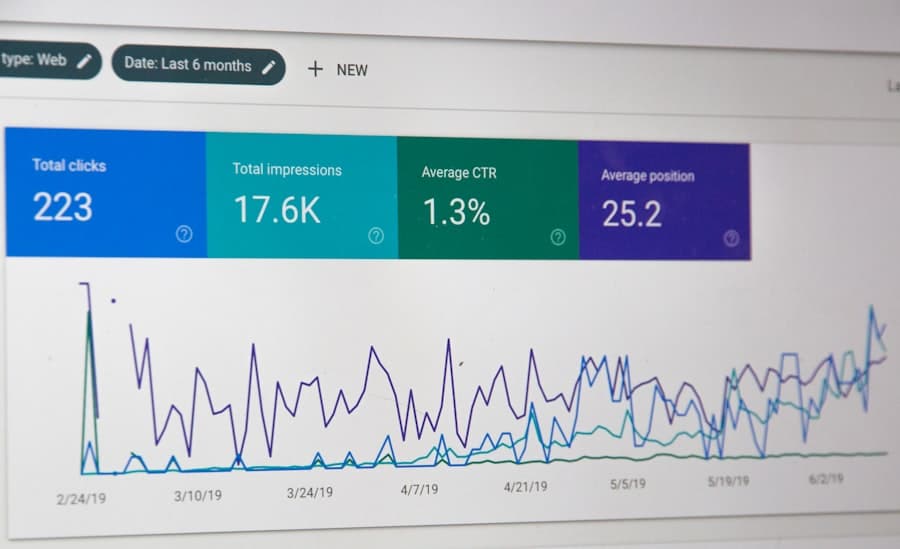In today’s digital landscape, artificial intelligence (AI) has emerged as a transformative force, reshaping how businesses interact with their customers. Personalization, a key aspect of this transformation, refers to the tailoring of experiences, products, and services to meet individual user preferences and behaviors. As you navigate through various online platforms, you may have noticed how recommendations seem to align perfectly with your interests.
This is no coincidence; it is the result of sophisticated AI algorithms that analyze vast amounts of data to create a more engaging and relevant experience for you. The integration of AI into personalization strategies has become essential for businesses aiming to enhance customer satisfaction and loyalty. By leveraging AI technologies, companies can analyze user data in real-time, allowing them to deliver customized experiences that resonate with you on a personal level.
This not only improves your interaction with brands but also drives higher conversion rates and fosters long-term relationships. As you delve deeper into the world of AI and personalization, you will discover how these technologies are revolutionizing various sectors, from e-commerce to content delivery, ultimately shaping the future of user experience.
Key Takeaways
- AI enables personalized user experiences by analyzing data and predicting user behavior
- Understanding user behavior through AI helps businesses tailor their offerings to individual preferences
- AI-powered personalization in e-commerce improves customer satisfaction and increases sales
- AI is instrumental in personalizing content recommendations to enhance user engagement
- AI plays a crucial role in personalizing customer service by providing tailored support and recommendations
Understanding User Behavior through AI
To effectively personalize experiences, it is crucial to understand user behavior. AI plays a pivotal role in this process by collecting and analyzing data from various sources, including browsing history, purchase patterns, and social media interactions. As you engage with different platforms, AI algorithms track your actions and preferences, creating a comprehensive profile that reflects your interests and needs.
This data-driven approach enables businesses to gain insights into your behavior, allowing them to tailor their offerings accordingly. Moreover, AI can identify trends and patterns that may not be immediately apparent to human analysts. For instance, it can detect subtle shifts in your preferences over time or recognize when you are likely to make a purchase based on your browsing habits.
By understanding these nuances, businesses can proactively adjust their strategies to better serve you. This level of insight not only enhances your experience but also empowers companies to anticipate your needs, creating a more seamless interaction between you and the brand.
AI-powered Personalization in E-commerce

E-commerce has been one of the most significant beneficiaries of AI-powered personalization. As you shop online, you may encounter product recommendations that seem tailored just for you. This is made possible by AI algorithms that analyze your past purchases, browsing history, and even the behavior of similar users.
By understanding what products you are likely to be interested in, e-commerce platforms can present options that resonate with your tastes, making your shopping experience more enjoyable and efficient. Additionally, AI can optimize pricing strategies based on your behavior and preferences. For example, if you frequently purchase items during sales or promotions, an e-commerce site might offer you personalized discounts or alerts when items on your wishlist go on sale.
This not only encourages you to make a purchase but also fosters a sense of loyalty as you feel valued as a customer. The ability of AI to create such personalized shopping experiences is revolutionizing the e-commerce landscape, making it more competitive and customer-centric.
AI in Personalizing Content Recommendations
Content consumption has evolved dramatically in recent years, with platforms like streaming services and news websites utilizing AI to deliver personalized recommendations. As you scroll through your favorite streaming service or news app, you may notice that the content suggested aligns closely with your viewing or reading habits. This is the result of advanced algorithms that analyze your interactions and preferences to curate a selection of content that is most likely to engage you.
AI-driven content recommendations not only enhance your experience but also keep you engaged for longer periods. By presenting you with shows, articles, or videos that match your interests, these platforms increase the likelihood that you will continue consuming their content. Furthermore, as you interact with the recommended content—whether by watching a series or reading an article—the AI system learns from your feedback, continuously refining its suggestions to better suit your evolving tastes.
This dynamic process creates a personalized content ecosystem that keeps you coming back for more.
The Role of AI in Personalizing Customer Service
Customer service is another area where AI-driven personalization is making significant strides. When you reach out for support—whether through chatbots or live agents—AI can analyze your previous interactions and preferences to provide tailored assistance. For instance, if you’ve previously contacted customer support about a specific issue, the system can flag this information for the representative or chatbot assisting you, allowing for a more informed and efficient resolution.
Moreover, AI can enhance self-service options by providing personalized FAQs or troubleshooting guides based on your past inquiries. This not only empowers you to find solutions quickly but also reduces the workload on customer service teams. As businesses continue to adopt AI technologies in their customer service strategies, the focus will increasingly shift toward creating personalized experiences that cater to individual needs, ultimately leading to higher satisfaction rates.
Leveraging AI for Personalized Marketing Campaigns

Marketing campaigns have also been transformed by the integration of AI-driven personalization. As you receive targeted advertisements or promotional emails that align with your interests, it becomes evident how AI analyzes user data to craft messages that resonate with specific audiences. By segmenting users based on their behavior and preferences, businesses can create highly personalized marketing campaigns that capture your attention more effectively than generic advertisements.
Furthermore, AI can optimize the timing and delivery of marketing messages based on when you are most likely to engage with them. For example, if data shows that you tend to open emails in the evening or browse social media during lunch breaks, marketers can schedule their campaigns accordingly. This level of precision not only increases the chances of conversion but also enhances your overall experience as a consumer by delivering relevant content at the right moment.
Ethical Considerations in AI-driven Personalization
While the benefits of AI-driven personalization are substantial, it is essential to address the ethical considerations surrounding its implementation. As businesses collect vast amounts of data about users like yourself, concerns about privacy and data security arise. You may wonder how your information is being used and whether it is being shared with third parties without your consent.
Transparency in data collection practices is crucial for building trust between consumers and businesses. Moreover, there is the risk of creating echo chambers through overly personalized experiences. If algorithms only present content or products that align with your existing preferences, it may limit your exposure to diverse perspectives or new ideas.
Striking a balance between personalization and maintaining a broad range of options is vital for ensuring a healthy user experience. As companies continue to leverage AI for personalization, they must prioritize ethical considerations to foster trust and ensure that users feel comfortable engaging with their platforms.
The Future of AI in Personalizing User Experience
Looking ahead, the future of AI in personalizing user experiences appears promising yet complex. As technology continues to advance, we can expect even more sophisticated algorithms capable of understanding nuanced human behaviors and preferences. This evolution will likely lead to hyper-personalized experiences where businesses can anticipate your needs before you even express them.
However, as this level of personalization becomes more prevalent, it will be crucial for companies to navigate the ethical landscape carefully. Striking a balance between leveraging data for personalization and respecting user privacy will be paramount in maintaining trust and fostering long-term relationships with customers like yourself. Ultimately, the future of AI-driven personalization holds immense potential for enhancing user experiences across various sectors while also challenging businesses to uphold ethical standards in their practices.
In conclusion, as you explore the world shaped by AI and personalization, it becomes clear that these technologies are not just trends but fundamental shifts in how businesses engage with consumers. From understanding user behavior to delivering tailored content and services, AI is redefining what it means to create meaningful connections between brands and individuals. As we move forward into this new era, embracing both the opportunities and challenges presented by AI will be essential for shaping a future where personalized experiences enhance our daily lives.
In a related article on AI Lab 360, “AI in Healthcare: Transforming Medical Diagnosis and Treatment,” explores how artificial intelligence is revolutionizing the healthcare industry by improving medical diagnosis and treatment. This article delves into the various ways AI is being used in healthcare settings to personalize patient care and enhance overall outcomes. To learn more about the impact of AI in healthcare, check out the article here.
FAQs
What is AI?
AI, or artificial intelligence, refers to the simulation of human intelligence in machines that are programmed to think and act like humans. This includes tasks such as learning, problem-solving, and decision-making.
How does AI personalize user experience?
AI personalizes user experience by analyzing user data and behavior to provide tailored recommendations, content, and interactions. This can include personalized product recommendations, content suggestions, and targeted marketing messages.
What are some examples of AI personalization in user experience?
Examples of AI personalization in user experience include personalized product recommendations on e-commerce websites, content recommendations on streaming platforms, and personalized email marketing campaigns based on user behavior and preferences.
What are the benefits of AI personalization in user experience?
The benefits of AI personalization in user experience include improved customer satisfaction, increased engagement and retention, higher conversion rates, and more effective marketing efforts. Personalized experiences can also lead to a deeper understanding of user preferences and behaviors.
What are the potential concerns or challenges with AI personalization in user experience?
Some potential concerns with AI personalization in user experience include privacy issues related to the collection and use of user data, the risk of creating filter bubbles and echo chambers, and the potential for algorithmic bias and discrimination. It’s important for organizations to be transparent about their use of AI personalization and to prioritize user privacy and data security.






